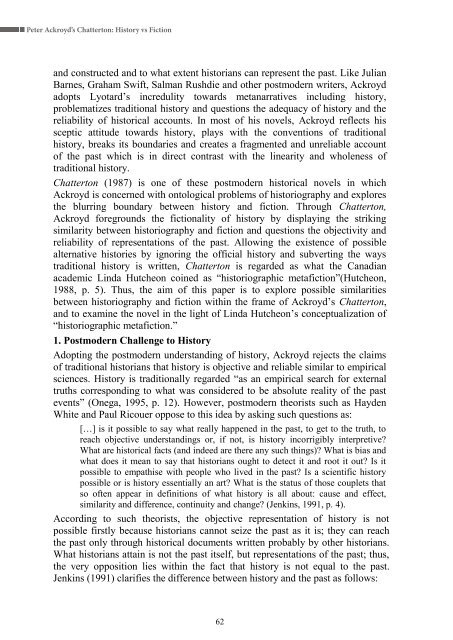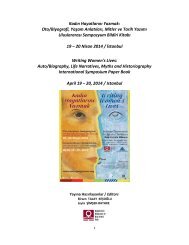- Page 1:
ISSN: 2147-088XHUMANITASULUSLARARAS
- Page 5:
HUMANITASUluslararas Sosyal Bilimle
- Page 9 and 10:
İÇİNDEKİLER / CONTENTSAli TİLB
- Page 11 and 12:
SUNUŞÜçüncü saysndan itibaren
- Page 13 and 14: olarak Franszcann öğretiminde far
- Page 15 and 16: PRESENTATIONOur Journal previously
- Page 17 and 18: study conducted with 19 students, a
- Page 19 and 20: HUMANITAS Sayı - Number: 4Güz / A
- Page 21 and 22: Hülya Bayrak AKYILDIZ(Brenot, 1921
- Page 23 and 24: Hülya Bayrak AKYILDIZanlar. Yurdun
- Page 25 and 26: Hülya Bayrak AKYILDIZpolis zoruyla
- Page 27 and 28: Hülya Bayrak AKYILDIZolunabilir, e
- Page 29 and 30: Hülya Bayrak AKYILDIZBu isimsiz ya
- Page 31: Hülya Bayrak AKYILDIZliterature th
- Page 34 and 35: Basic Design Education Parameters i
- Page 36 and 37: Basic Design Education Parameters i
- Page 38 and 39: Basic Design Education Parameters i
- Page 40 and 41: Basic Design Education Parameters i
- Page 42 and 43: Basic Design Education Parameters i
- Page 44 and 45: Basic Design Education Parameters i
- Page 46 and 47: Basic Design Education Parameters i
- Page 48 and 49: Basic Design Education Parameters i
- Page 50 and 51: Sınav ve İktidarolarak tanmlanmak
- Page 52 and 53: Sınav ve İktidar"Öğretmen, kura
- Page 54 and 55: Sınav ve İktidar“iktidar mekani
- Page 56 and 57: Sınav ve İktidardayal iktidar hak
- Page 58 and 59: Sınav ve İktidarbrakmaktadr. Tür
- Page 60 and 61: Sınav ve İktidar…Okullar resmi
- Page 62 and 63: Sınav ve İktidarplace recently, i
- Page 66 and 67: Peter Ackroyd’s Chatterton: Histo
- Page 68 and 69: Peter Ackroyd’s Chatterton: Histo
- Page 70 and 71: Peter Ackroyd’s Chatterton: Histo
- Page 72 and 73: Peter Ackroyd’s Chatterton: Histo
- Page 74 and 75: Peter Ackroyd’s Chatterton: Histo
- Page 77 and 78: HUMANITAS Sayı - Number: 4Güz / A
- Page 79 and 80: Feryal ÇUBUKÇU - Merve GÜVENs. 2
- Page 81 and 82: Feryal ÇUBUKÇU - Merve GÜVENhast
- Page 83 and 84: Feryal ÇUBUKÇU - Merve GÜVENgire
- Page 85 and 86: Feryal ÇUBUKÇU - Merve GÜVENkork
- Page 87 and 88: Feryal ÇUBUKÇU - Merve GÜVENLant
- Page 89 and 90: HUMANITAS Sayı - Number: 4Güz / A
- Page 91 and 92: Anzavur DEMİRPOLAT - Sıtkı YILDI
- Page 93 and 94: Anzavur DEMİRPOLAT - Sıtkı YILDI
- Page 95 and 96: Anzavur DEMİRPOLAT - Sıtkı YILDI
- Page 97 and 98: Anzavur DEMİRPOLAT - Sıtkı YILDI
- Page 99 and 100: Anzavur DEMİRPOLAT - Sıtkı YILDI
- Page 101 and 102: Anzavur DEMİRPOLAT - Sıtkı YILDI
- Page 103 and 104: Anzavur DEMİRPOLAT - Sıtkı YILDI
- Page 105 and 106: Anzavur DEMİRPOLAT - Sıtkı YILDI
- Page 107 and 108: Anzavur DEMİRPOLAT - Sıtkı YILDI
- Page 109 and 110: Anzavur DEMİRPOLAT - Sıtkı YILDI
- Page 111 and 112: HUMANITAS Sayı - Number: 4Güz / A
- Page 113 and 114: Ümit EKİN - Hümmet KANALdoğuda
- Page 115 and 116:
Ümit EKİN - Hümmet KANALMüftü
- Page 117 and 118:
Ümit EKİN - Hümmet KANALYüzdeli
- Page 119 and 120:
Ümit EKİN - Hümmet KANALyaşadğ
- Page 121 and 122:
Ümit EKİN - Hümmet KANAL1319 sal
- Page 123 and 124:
Ümit EKİN - Hümmet KANALTekfurda
- Page 125 and 126:
Ümit EKİN - Hümmet KANALbir haft
- Page 127 and 128:
Ümit EKİN - Hümmet KANALkuruş g
- Page 129 and 130:
Ümit EKİN - Hümmet KANALTuncel,
- Page 131 and 132:
HUMANITAS Sayı - Number: 4Güz / A
- Page 133 and 134:
Hanife Nâlân GENÇ - Songül Erdo
- Page 135 and 136:
Hanife Nâlân GENÇ - Songül Erdo
- Page 137 and 138:
Hanife Nâlân GENÇ - Songül Erdo
- Page 139 and 140:
Hanife Nâlân GENÇ - Songül Erdo
- Page 141 and 142:
Hanife Nâlân GENÇ - Songül Erdo
- Page 143 and 144:
HUMANITAS Sayı - Number: 4Güz / A
- Page 145 and 146:
Zühre Yılmaz GÜNGÖRöğrenciler
- Page 147 and 148:
Zühre Yılmaz GÜNGÖRweek-end Se
- Page 149 and 150:
Zühre Yılmaz GÜNGÖRdolaysyla da
- Page 151 and 152:
Zühre Yılmaz GÜNGÖR8. Öğrenci
- Page 153 and 154:
Zühre Yılmaz GÜNGÖRMorlat, J. -
- Page 155 and 156:
HUMANITAS Sayı - Number: 4Güz / A
- Page 157 and 158:
Emine GÜZELmémoire universelle de
- Page 159 and 160:
Emine GÜZELêtre conscient. Le psy
- Page 161 and 162:
Emine GÜZELimprévisible présence
- Page 163 and 164:
Emine GÜZELLe récit a commencé p
- Page 165 and 166:
Emine GÜZELYasmine, Y. (25 septemb
- Page 167 and 168:
HUMANITAS Sayı - Number: 4Güz / A
- Page 169 and 170:
Cahit KAHRAMAN- Buğra ZENGİNmemor
- Page 171 and 172:
Cahit KAHRAMAN- Buğra ZENGİN4. Me
- Page 173 and 174:
Cahit KAHRAMAN- Buğra ZENGİN“no
- Page 175 and 176:
Cahit KAHRAMAN- Buğra ZENGİNand e
- Page 177 and 178:
Cahit KAHRAMAN- Buğra ZENGİN16. I
- Page 179 and 180:
Cahit KAHRAMAN- Buğra ZENGİNfemal
- Page 181 and 182:
Cahit KAHRAMAN- Buğra ZENGİNthe a
- Page 183 and 184:
Cahit KAHRAMAN- Buğra ZENGİN(cevi
- Page 185 and 186:
HUMANITAS Sayı - Number: 4Güz / A
- Page 187 and 188:
Yakup KURTyitirilen insanlk değeri
- Page 189 and 190:
Yakup KURTYasalar hakka yabanc 6Bar
- Page 191 and 192:
Yakup KURTGöç olgusunu iliklerine
- Page 193 and 194:
Yakup KURTdünyay kurtarmayaklcn ku
- Page 195 and 196:
Yakup KURTve analarmz,dünya analar
- Page 197 and 198:
Yakup KURTminorities living in thes
- Page 199 and 200:
HUMANITAS Sayı - Number: 4Güz / A
- Page 201 and 202:
Özlem ÖZENultimate Individual. Th
- Page 203 and 204:
Özlem ÖZEN3. DeterminismAccording
- Page 205 and 206:
Özlem ÖZENEmerson’s faith is ba
- Page 207 and 208:
Özlem ÖZENHaldar, H. (1899). The
- Page 209 and 210:
HUMANITAS Sayı - Number: 4Güz / A
- Page 211 and 212:
Duygu Öztin PASSERATsöylenen şey
- Page 213 and 214:
Duygu Öztin PASSERATdüşünmekted
- Page 215 and 216:
Duygu Öztin PASSERATsöyleminde en
- Page 217 and 218:
Duygu Öztin PASSERATbu bağlamdaki
- Page 219 and 220:
Duygu Öztin PASSERATBenim oğlum b
- Page 221 and 222:
Duygu Öztin PASSERATİkinci ve ü
- Page 223 and 224:
Duygu Öztin PASSERATmihrak” olar
- Page 225 and 226:
Duygu Öztin PASSERATAydn, E. (Derl
- Page 227 and 228:
HUMANITAS Sayı - Number: 4Güz / A
- Page 229 and 230:
Jale SEZEN - Ahmet KUBAŞsanayi kur
- Page 231 and 232:
Jale SEZEN - Ahmet KUBAŞverilen ev
- Page 233 and 234:
Jale SEZEN - Ahmet KUBAŞalnmas ile
- Page 235 and 236:
Jale SEZEN - Ahmet KUBAŞKrklareli-
- Page 237 and 238:
Jale SEZEN - Ahmet KUBAŞAnonim (20
- Page 239 and 240:
HUMANITAS Sayı - Number: 4Güz / A
- Page 241 and 242:
Hakan SOYDAŞ1. Voltaire ve İmgele
- Page 243 and 244:
Hakan SOYDAŞYazar yaşadğ tecrüb
- Page 245 and 246:
Hakan SOYDAŞarasnda canl bir iliş
- Page 247 and 248:
Hakan SOYDAŞtanmlamak için kullan
- Page 249 and 250:
Hakan SOYDAŞ5. Felsefe-Bilim Çat
- Page 251 and 252:
Hakan SOYDAŞellisini” çözmüş
- Page 253 and 254:
Hakan SOYDAŞzihninde, kendi iç d
- Page 255 and 256:
Hakan SOYDAŞ(…) Bütün bu daval
- Page 257 and 258:
Hakan SOYDAŞbooks. (Tr. Edward Wil
- Page 259 and 260:
Hakan SOYDAŞcommon thematic and st
- Page 261 and 262:
HUMANITAS Sayı - Number: 4Güz / A
- Page 263 and 264:
Sevda Gülşah YILDIRIM - Eren YÜR
- Page 265 and 266:
Sevda Gülşah YILDIRIM - Eren YÜR
- Page 267 and 268:
Sevda Gülşah YILDIRIM - Eren YÜR
- Page 269 and 270:
Sevda Gülşah YILDIRIM - Eren YÜR
- Page 271 and 272:
Sevda Gülşah YILDIRIM - Eren YÜR
- Page 273 and 274:
Sevda Gülşah YILDIRIM - Eren YÜR
- Page 275 and 276:
Sevda Gülşah YILDIRIM - Eren YÜR
- Page 277 and 278:
Sevda Gülşah YILDIRIM - Eren YÜR
- Page 279 and 280:
Sevda Gülşah YILDIRIM - Eren YÜR
- Page 281 and 282:
YAYIN DEĞERLENDİRME / REVIEWAsuta
- Page 283 and 284:
HUMANITASUluslararas Sosyal Bilimle
- Page 285 and 286:
Alt Kenar BoşlukSol Kenar BoşlukS
- Page 287 and 288:
Yasa ve Yönetmelikler: İlköğret
- Page 289 and 290:
Müzik Kayd: Erkin, U. C. (1995). A
- Page 291 and 292:
HUMANITASInternational Journal of S
- Page 293 and 294:
Bottom Margin 2,5 cmLeft Margin2,5
- Page 295 and 296:
Encyclopedia subject: Ersoy, O. (19
- Page 297:
Erkin, U. C. (1932). Improvisation
















